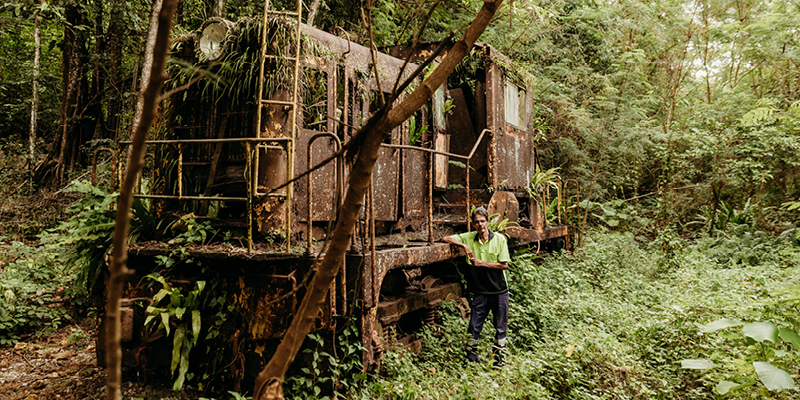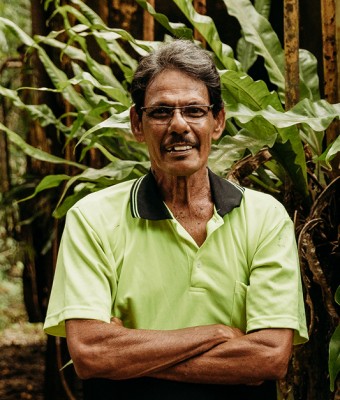Jude De Cruz
The broad outlines of Jude De Cruz’s story are shared by many Christmas Islanders of his generation.
He came to the Island looking for work and was won over by everything else it has to offer.
But, like his peers, Jude’s story is equally worth remembering and celebrating as an enduring part of a community that has endured a constant rollercoaster since he first arrived in the 1970s.
The De Cruz family’s history with the Island began with Jude’s elder brother.
“My brother spent one year here, but he went on holidays, so he recommended my other brother and myself to look for a job here,” he recalls.
So it was that Jude, fresh off two years of national service in Singapore, made his way to Christmas Island alongside his brother Ron.
Jude, now 66, still clearly recalls his early days on Christmas Island, and what the environment was like when he arrived 45 years ago.
“When I first arrived, it was like a cowboy town, we were out in the bush,” he says.
“I didn’t have a room yet, so I stayed with my friend at the settlement for a couple of months.
“It was just an empty room with a wooden bed and a steel cabinet – we have to buy our own mattresses and pillows.”
Despite the lack of television, radio or other modern amenities, Jude says he quickly fell in love with the Christmas Island lifestyle.
“It’s a peaceful place,” he explains.
“It is quiet here, so it was mainly mixing with friends and having fun.
“It was good, yeah.”
Without a job in place before he disembarked to the Island, Jude and his brother spent a week lining up at the labour office before being allocated to “the service gang”, doing odd jobs around the island.
Before long though, Jude settled into the role that many still remember him for – working on the Island’s trains.
Although long gone now, Christmas Island was once home to a standard 1435mm gauge industrial railway between Flying Fish Cove and South Point.
The initial railway was built between 1914 and 1920 to transport phosphate from the mine to the port and was about 17.5km long.
For such a small community, Christmas Island boasted an unusual range of locomotives hailing from Europe, North America and the Australian mainland.
The Island’s locomotive history has been the subject of some scholarly interest among railway enthusiasts, including an entire book on the subject – Shays, Crabs and Phosphate: A History of the Railways of Christmas Island, Indian Ocean by David Jehan.
Although Jude wasn’t around when the trains first started running, he was a central figure in their last days.
Jude was still in the service gang when he applied for the position of railway guard, beginning a journey to the top of the railway’s hierarchy.
“Two of us got in, we trained as guards and then after the guard we move up to assistant driver, then driver,” he says.
“After driver I became a controller. It was fun driving the trains.”
The railway closed with the mine in 1987 and the tracks mostly pulled up and sold.
This period in Jude’s life earned him the status of “the last train driver” on Christmas Island, but it was far from his last job.
In addition to being a part of the Union of Christmas Island Workers push to reopen the mine, Jude would eventually channel his love of the outdoors into a new career with the national park service.
“I don’t like sitting down in the office, I just like being out there,” he explains.
“You got to see a lot of places on the Island, sometimes places that have never been viewed before.”
Jude later completed a four-year course on horticulture and mine rehabilitation, which would play a significant role in the remainder of his working career.
Today, Jude is mostly retired, but his love of the outdoors and nature remains.
These days it manifests in his impressive nursery, where he grows palms, coconut trees and a mix of other plants.
I can walk from my office at the nursery and look at my seedlings,” he says.
“That’s why I love nature.”

His garden isn’t the only source of growth on the Island, which has witnessed a tourism boom throughout the COVID-19 pandemic.
“At the moment there are a lot of tourists because of COVID,” he says.
“People want to leave the mainland and they can’t go anywhere else.
“They come to Christmas and Cocos Islands.”
Despite the present influx, Jude believes the industry needs more time to keep growing to take the place of the mine as the Island’s primary source of employment.
“Businesses are surviving at the moment – but we still need more to come here,” he says.
As the ‘last train driver’, who witnessed the end of railways on the Island, Jude is confident that his home will endure as it has time and time again.
“Christmas Island is always up and down,” he asserts.
“The mine closed, then after it re-opened up. We got the detention centre opening, and then it shut and now they opened it up again. It’s just ups and downs.
“But every time when something shuts, something opens.”


